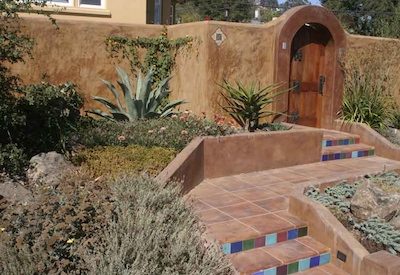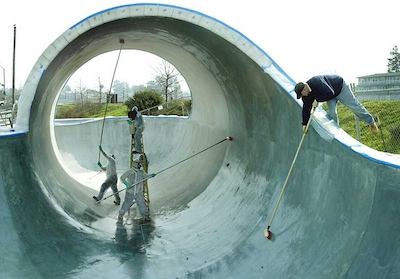The Contractor/Client relationship is no different than any other relationship. There's a balance that needs to be maintained. In this Q&A Tom shares advice for contractor and client alike. Remember, it's all about communication. Read on and do great work.
How do you identify an ideal client?
 Tom Ralston: As a decorative concrete contractor the client we love to work with is passionate about aesthetics and excited about the realm of possibilities that concrete has to offer. It's these clients that we can engage with and talk about ideas of things to create within the medium of concrete.
Tom Ralston: As a decorative concrete contractor the client we love to work with is passionate about aesthetics and excited about the realm of possibilities that concrete has to offer. It's these clients that we can engage with and talk about ideas of things to create within the medium of concrete.
The ideal client also is not so constricted on budget, although all projects have to have a reasonable cost. When doing projects that are both decorative and exciting, it just costs more money. The ideal client understands that and they're willing to pay more for a memorable and exciting product.
What are some of the criteria you use when deciding who to work with? How has that criteria changed over the years?
TR: The criteria I use to decide who to work with is pretty extensive. I've actually written a small treatise on signs of a problematic client. It raises a few red flags to watch out for.
First, a client that goes back and forth on ideas can cost both time and money.
Second, clients that want to go over every single line item and ask how they can save money causes the budget to become the main focus of a project. It becomes less about the project and what the final product will look like and more about the money.
Third, a 'do it your self' client that wants to do 70% of the work him or herself and have the contractor do just a little piece of it can definitely complicate jobs.
To answer the second part of the question, the way the criteria has changed has been through job costing. We document as much as we can. My site managers, my office manager, and myself try and document what project has had problems, how those problems come about and why.
We ask questions like; what are some of the reasons there were problems? Who was the client? What were the conditions? Answering these questions help us understand all the aspects of running a successful job and the inherent risks. When you know what the inherent risks are that can affect how much time various projects will take and what will drive up costs. Costs equal more money and money can equal stress. Our criteria changes as we continue to analyze jobs and see what went wrong and what went well.
Can you give some advice to concrete contractors out there on how to deal with challenging clients?
 T.R: Try to get everything on paper and leave no stone unturned if possible. Write out everything that you possibly can. A good friend of mine said, "if it's not written it doesn't exist". You need to be very clear and concise. Basically communicate as efficiently as possible.
T.R: Try to get everything on paper and leave no stone unturned if possible. Write out everything that you possibly can. A good friend of mine said, "if it's not written it doesn't exist". You need to be very clear and concise. Basically communicate as efficiently as possible.
What are some of the most common problems that arise?
T.R: Things like scope of work, what is included and what is not. You have to have everything specifically stated in contracts. Things need to be agreed upon, everything needs to be clear in the beginning so problems can be eliminated. With decorative concrete if a schedule isn't kept things can become rushed. That can lead to a final product can sometimes turn out less than stellar.
What advice can you give to homeowners, architects and anyone else in terms of choosing the right contractor to work with?
T.R: Do your own digging. By that I mean ask for references, check out their work, communicate with them ahead of time and bring in all of the parties that are responsible for the final product, i.e. architects, clients, contractors, and homeowners. Get everyone together to discuss the project at length.
I really enjoy that part of the process because it gives me the opportunity to expound upon various details and little nuances that concrete can have and it also allows me to understand if I'm going to be a good fit for a particular client or not. Engage in as much communication as you can with potential contractors and get to know them to see if they are right for your project.
Any advice for clients on how to deal with a challenging contractor?
 T.R: A client has quite a bit of leverage when dealing with a contractor; they are writing the checks and giving the go ahead. It may be a good idea for a client to hold back payments if there are things that are not completed as per your agreement.
T.R: A client has quite a bit of leverage when dealing with a contractor; they are writing the checks and giving the go ahead. It may be a good idea for a client to hold back payments if there are things that are not completed as per your agreement.
The client also has a lot of sway with the board of contractors or any state license board. Make sure to have everything in writing. For example, saving all the emails that have been exchanged. That is a great way to build a case if that becomes necessary. Hopefully it won't be, but either way it helps keep track of the way a project is going.
Will you share a personal experience you've had dealing with either a challenging client, contractor, or both? What are some of the most challenging experiences you've had? What about the most rewarding?
T.R: I've been in the concrete business for a quarter of a century. I have had challenging experiences with clients and contractors both. Some clients say they just won't pay because the product has not come out to their satisfaction. Things just don't turn out the way they're expected to sometimes.
So much can compromise a concrete finish. You may have some product that just won't perform the way it should. I've had concrete freeze overnight and pop the next day and I had to jackhammer it all out. What are you gonna do? Sometimes it's just easier to go fix what's happened even if it does cost time.
I have had experience working with challenging contractors, there have been so many cases where contractors have been outstandingly bad.
The most rewarding moments with a client comes when a friendship is made. It's very rewarding to hear a client rave about your work and they absolutely love what it is you do. If the end result has come out really nice and the relationship has been fostered well you can end up making a great friend because of a job. Also some of the work TRC has completed on public display gives me a great sense of satisfaction.
Alright folks, that's it for this week's Decorative Concrete Master Q&A, join us next time for more stories and knowledge from decorative concrete master Tom Ralston. We post these Master Q&A's on the first and third Fridays of each month.
Submit your own questions here, and to find more information check out Tom's books on decorative concrete. Also, we'd love it if you'd come over and say hello on one of our social sites. Follow us or like us for more expert decorative concrete knowledge on Houzz, LinkedIn, Facebook or Instagram.